In New York City Borough, Community-Focused Businesses Fill Gaps in Local Economy and Strengthen the Supply Chain
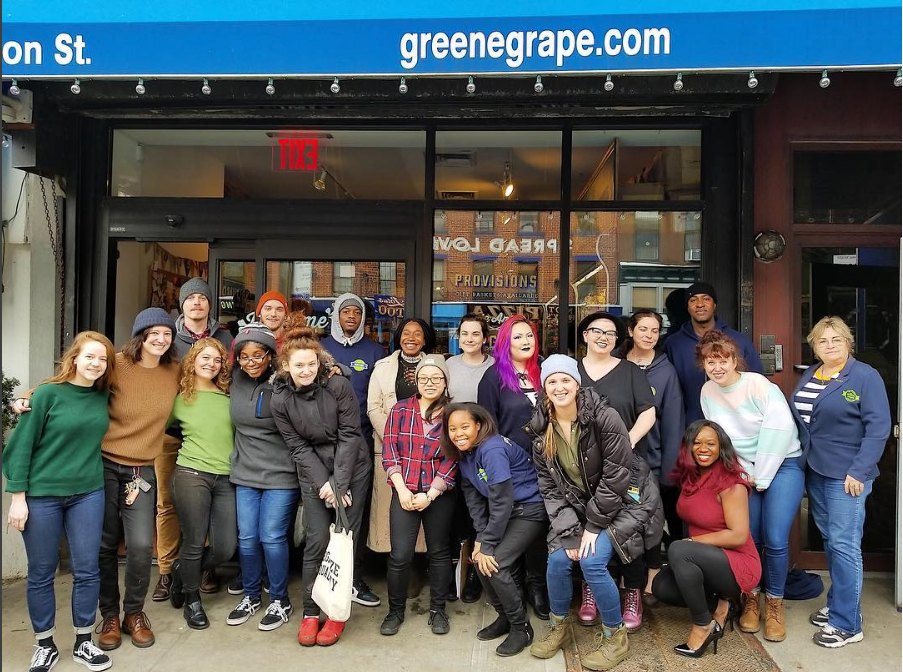
This article is one in a series highlighting the Best for NYC, a growing community of more than 1,500 local businesses focused on improving the lives of their workers. To learn more about the 2019 campaign, visit bestfor.nyc.
By Alice Maggio
After the birth of her first child more than 15 years ago, Amy Bennett found that practicing law as an attorney and taking care of her family was not working. “I craved something that would engage me intellectually, like working in a law firm, but that had a little more freedom,” she explains. “And at the time the neighborhood needed a wine store.” She looked up how to get a liquor license, and the very next day she incorporated a new company, The Greene Grape. The shop opened in Fort Greene, Brooklyn, four months later, on April 23, 2004.
This was just one year after the Australian mass-produced wine Yellowtail became the №1 imported wine in America, so a wine store that specialized in selling artisanal bottles from small-scale vineyards was, as The New York Times put it at the time, “quirky.” At first it was terrifying, Bennett says, but she soon got her “retail chops,” and what started as a single enterprise has now grown into a family of three businesses: The Greene Grape Wine & Spirits, The Greene Grape Provisions, and the Annex, a coffee shop and bar just a few doors down from the grocery and wine shops.
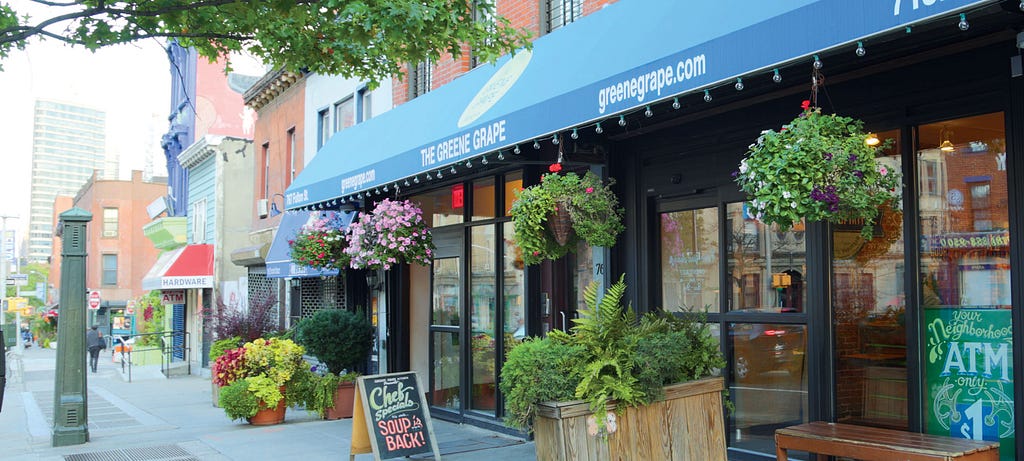
The key to all three, Bennett says, is that they filled gaps in the local economy. For example, after a few years in business the wine shop had built a customer base of people excited about the small-scale production wines offered there. It seemed logical that these same customers would like food to go with their wine. After all, Bennett points out, “only 20% of people drink alcohol, but 100% of people eat.” She tried recruiting gourmet grocers to Fort Greene, but nobody took the bait. “So I finally said, ‘I’m going to do it,’ which actually was crazy.”
An inclusive economy is one that creates opportunity for all people of all backgrounds and experiences to live with dignity, to support themselves and their families, and to make a contribution to their communities. Access free resources from B Lab to build a more inclusive economy through your business.
Supporting Sustainability
Greene Grape Provisions opened in 2008. The inspiration was to do the same thing with food that the Greene Grape had done with wine. “I wanted to support small family farms, and bring people unique, ethical, sustainable options,” Bennett says. But there was a steep learning curve involved, especially because food spoils much faster than wine. “I’ll be forever grateful to the neighborhood for believing in us and supporting us, even when we weren’t doing it exactly right,” Bennett says of the first year of the grocery store.
The meat counter is probably where there was the most to learn. As Bennett talked with farmers, she realized that for them to make money selling to the Greene Grape rather than directly to customers, she needed to buy whole animals. But that meant training her staff in nose-to-tail butchery and educating customers on how to cook unfamiliar cuts. Bennett applied for and received a $10,000 grant from New York City to create a training program with Fleishers Craft Butchery.
What started as one of Greene Grape Provisions’ biggest challenges has now become one of its biggest successes. “That money has been amazing for New York and for our industry,” Bennett says, explaining that it has launched a flock of young butchers in the city, all focused on using the whole animal. The Greene Grape even makes its own soap, candles, and dog treats with some of the less-desirable cuts or scraps from the grass-fed meat sold at the counter.
At the Greene Grape, the supply chain becomes a conversation. For example, the butcher recommends a cut to the customer and describes how to cook it; the next time that customer is in the store he or she can report on how it turned out; the butcher can then report back to the farmers about what customers are saying, and the farmers can adjust their practices accordingly.
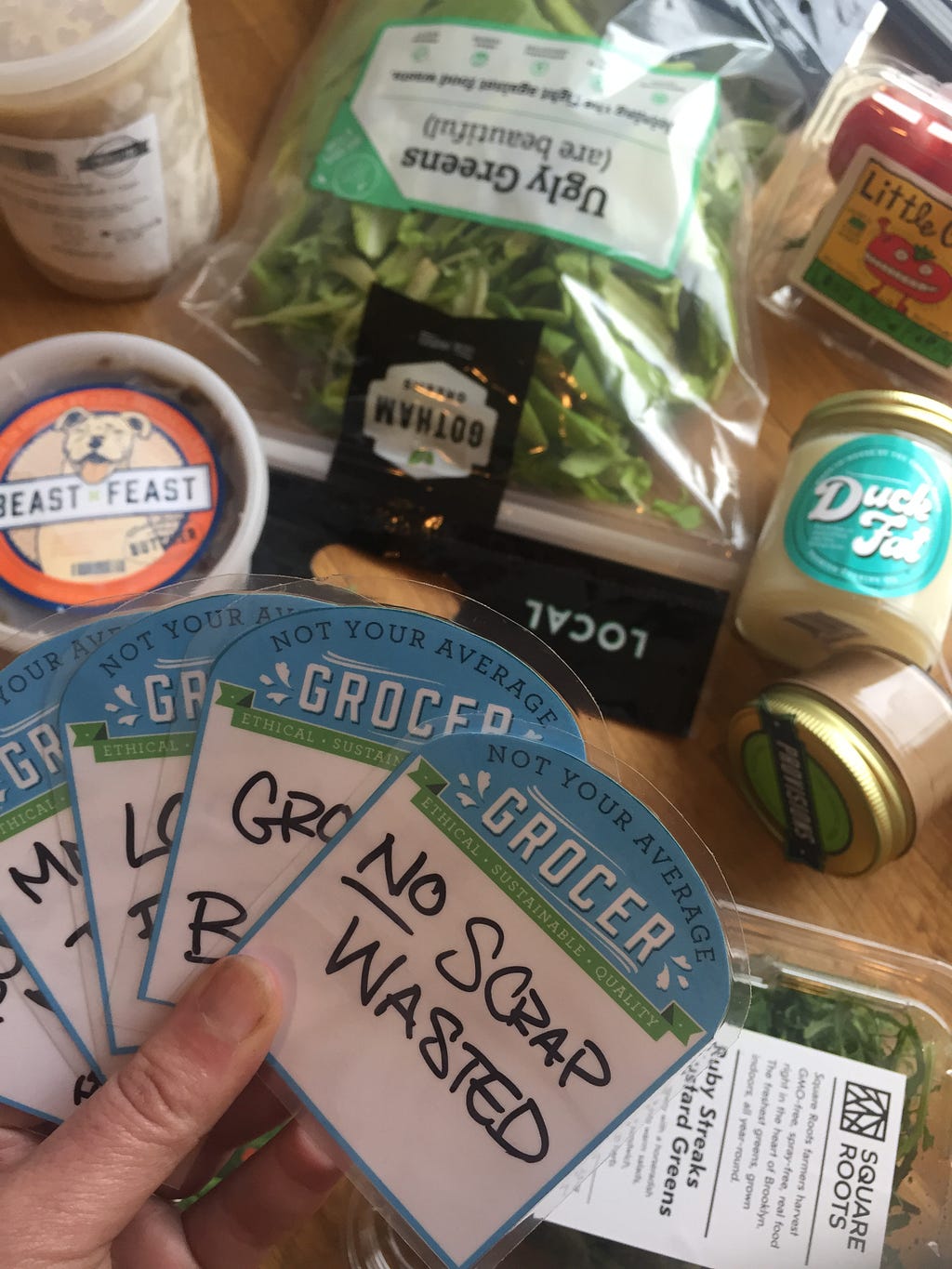
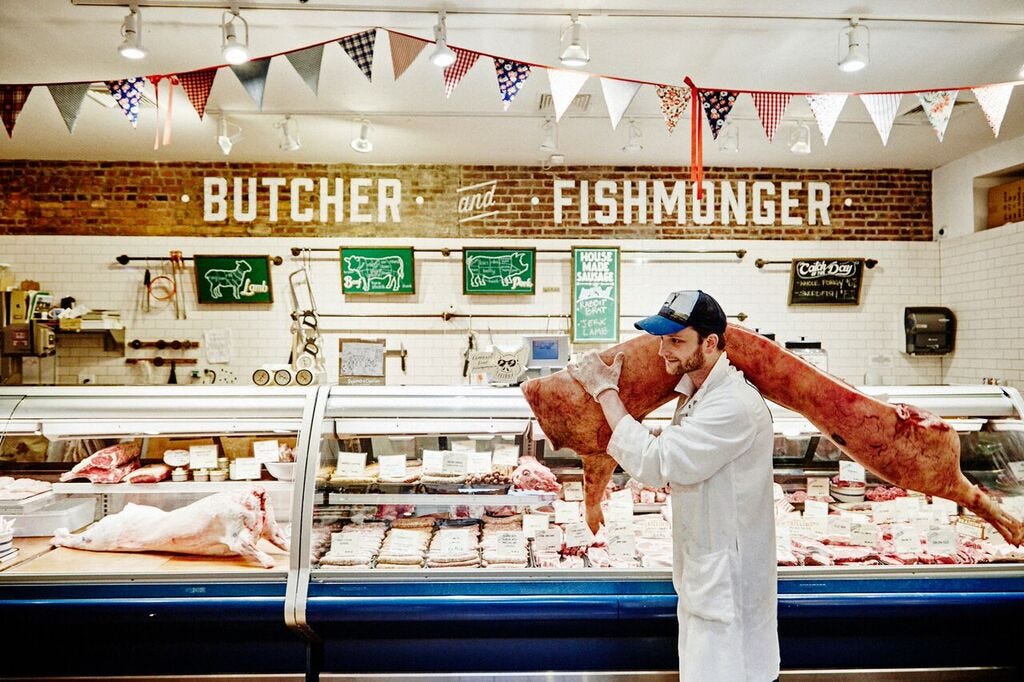
Strengthening the Food System
The training grant for butchery set off a chain reaction, and soon the Greene Grape staff members were attending trainings for wine, beer, cheese (resulting in house-made mozzarella) and coffee. The coffee training provided particularly fruitful, serving as the catalyst for creation of the Annex coffee shop and bar in 2011.
This is all part of what Bennett calls “putting the people back in the food equation” by participating in and strengthening a food system that is more human-scale, sustainable, transparent, and local.
In the summers, the Greene Grape aims to source at least 60% of its produce from New York state. Tags in the store indicate the provenance of all the products, one more way that the Greene Grape works to build bridges between consumers and producers.
Store managers always have discretion over the choice of products. This is an example of Bennett’s management style, which she calls “extreme delegation.”
“I used to be a micromanager, and I thought that only action counted,” she explains. But she soon realized that having a boss who is involved in every decision can inhibit people’s ability to develop their own judgment — and she began to consciously empower her staff to make decisions. “People are happier now,” she says.
Extreme delegation has a number of benefits, according to Bennett: It allows employees to do a lot of the fun work, like tasting and choosing products; it creates more connection between employees and their work by giving them more ownership; and it is more practical. As Bennett says: “I always like to hire someone who is better at something than I am.”
To support her employees in taking on such responsibility, Bennett practices financial transparency with her managers, so that they can make informed decisions. Employees also can see their margins and sales.
In addition, Bennett is a big fan of promoting from within. The Greene Grape’s director of operations, for example, started at the cheese counter in the grocery store, while the general manager of Annex started as a van driver. Bennett looks for people who are “Grapey,” meaning that they are willing to learn, stay engaged, and care how the job is done, no matter what it is. “You can teach someone skills, but not integrity, ethics, work ethic,” she says.
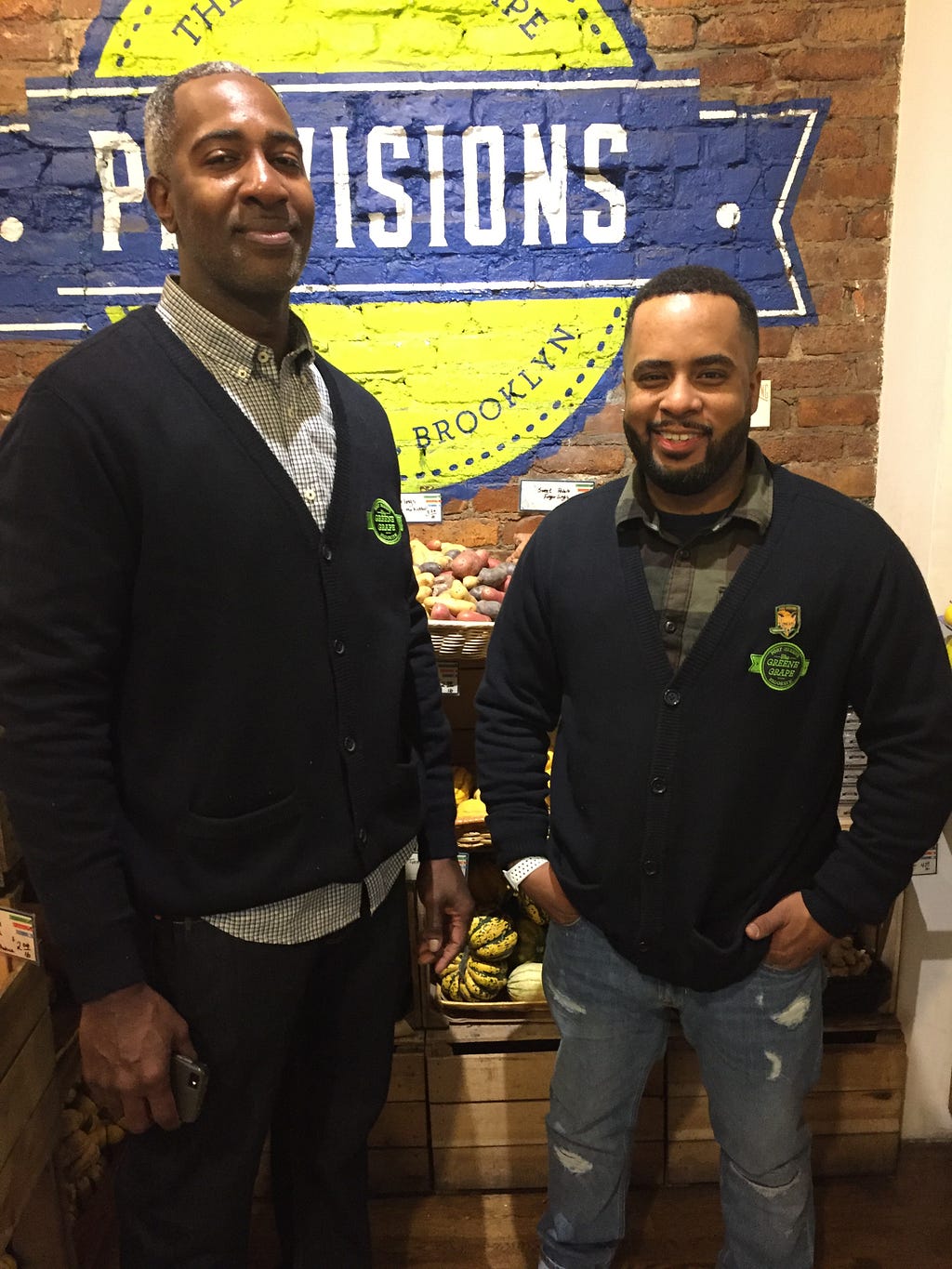
To properly compensate the 100 staff members for their commitment, the Greene Grape offers more paid time off than what is mandated by law — employees accrue time based on the number of hours they work — as well as bonuses that amount to about a 10% profit share. Bennett is proud of the fact that the Greene Grape spends about 30% of its revenue on payroll. According to her research, the grocery sector usually spends only about 18% of revenues on payroll. Even though the Greene Grape has historically paid above minimum wage, the upcoming rise in the NYC minimum wage will require some adjustment. Bennett says everyone at the Greene Grape is “psyched” about the change, even if it does mean some compression in the form of smaller raises for managers.
Finding a Balance
At this point, Bennett says, the three businesses have found a good balancing point where they are self-sustaining and reciprocal. Each individual business might experience rough spots, but together the community of businesses supports itself. Bennett thinks the Greene Grape businesses are successful because they offer something that draws people back.
“We’re a bright spot in multiple ways,” Bennett says, crediting the Greene Grape staff members for the integrity of their purchasing choices, their warmth, and their enthusiasm for sharing what they know with the customers. “People want to learn,” she says, “so give someone one little piece of new information and suddenly grocery shopping becomes so much more than a financial transaction.”
One bottle of wine, one whole steer, one ball of mozzarella, one farmer, one employee, and one customer at a time, Bennett hopes that the Greene Grape is making a difference. “I love being part of the the food scene in New York that is fearless and vibrant and entrepreneurial,” she says. “New York is where ideas germinate and creativity comes together, and then it takes off to the rest of the country. Just because it seems impossible doesn’t mean it can’t be done.”
The Greene Grape is a member of Best for NYC, an initiative of the New York City Mayor’s Office of Workforce Development in partnership with B Lab. Best for NYC aims to build a shared understanding that businesses can thrive financially while also making decisions that benefit their workers and their community.
B the Change gathers and shares the voices from within the movement of people using business as a force for good and the community of Certified B Corporations. The opinions expressed do not necessarily reflect those of the nonprofit B Lab.

The Greene Grape: Putting People Back in the Food Equation was originally published in B the Change on Medium, where people are continuing the conversation by highlighting and responding to this story.
Source: B the Change
